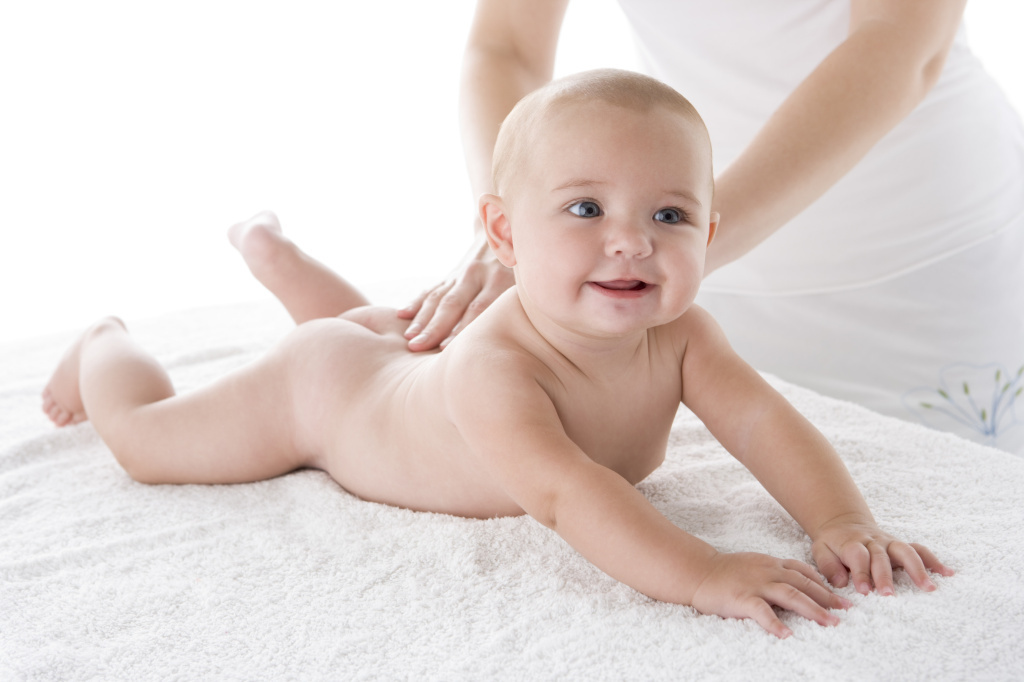A baby massage can help babies grow better and behave better. The skin-to-skin connection helps parents and baby better communicate without saying a word. Its an incredible tool for effectively relieving constipation, excess wind, fussiness and colic, and it is the most natural thing in the world. A specific routine involving the belly and chest can also help with colic.

To do a massage you will need to use oil and organic, cold-pressed oils are best. A blend of extra-virgin olive oil and sunflower oil, but you can use whatever oil you feel is best. Ensure you apply a little pressure to assist in the natural movement of the waste through the system. Don’t try a massage just before or after a meal or when she needs a nap.
Get Ready
When you and your baby are ready, set yourself up on the floor with a towel or baby sheet and a small bowl of oil suitable for massage. If your baby seems to be uncomfortable or starts crying before you have finished the massage, stop and give him/her a cuddle instead.
- Legs: Begin with the legs, as they’re less sensitive than some parts of the body. Using a little oil, wrap your hands around one of baby thighs and pull down, one hand after the other, squeezing gently, as if you’re “milking” the leg. Switch legs and repeat. Take one foot and gently rotate it a few times in each direction, then stroke the top of baby foot from the ankle down to the toes. Switch feet and repeat. Use your thumbs to trace circles all over the bottom of each foot. To finish off the feet, take each toe between your thumb and forefinger and gently pull until your fingers slip off the end. Repeat for all ten toes.
- Arms: Take one of baby arms in your hands and repeat the milking motion from the baby’s armpit all the way to her wrist. Then, take his/her hand and gently rotate the wrist a few times in each direction. Switch arms and repeat. Trace tiny circles over the palm of each of hands with your thumbs. Gently take a finger between your thumb and forefinger and pull, letting the finger slip through your grasp. Repeat for all the fingers and both thumbs.

- Chest: Place your hands together in prayer position over her heart. Then, opening out your hands slowly, stroke outward and lightly flatten the palms over her chest. Repeat several times. Place one hand flat across the top of his/her chest. Stroke it gently down to the thighs. Repeat the motion, alternating hands, several times.
- Back: Roll your baby onto his/her tummy. Using your fingertips, trace tiny circles on either side of the spine from the neck down to the buttocks. Finish with some long, firm strokes from her shoulders all the way to the feet. When you have finished, put on the nappy and cuddle or breastfeed the baby. She’ll probably doze off!
- A specific routine involving the belly and chest can help with colic. If you notice that your baby is getting fussy at a certain time at night, then do this routine about 15 to 20 minutes before that fussiness starts. With the baby lying on the back, begin to rub all around the abdomen in one big circle (clockwise direction), from just under the ribcage, out to the side of the abdomen, to the base, and again back up towards the ribcage. It’s very important to ensure you are stroking in a clockwise circular direction as otherwise you will work against the natural movements of the bowel.
Remember:

- Do the massage in a warm, quiet place — indoors or outdoors.
- Remove your jewelry.
- Use a gentle touch. Avoid tickling your baby, however, which might irritate him or her. As your baby grows, use a firmer touch.
- If your baby jiggles his or her arms and seems happy, he or she is likely enjoying the massage and you can continue. If your baby turns his or her head away from you or appears restless or unhappy, stop the massage and try again later.
If your baby has any underlying health issues, talk to your baby’s doctor before trying infant massage.
Disclaimer
The Content is not intended to be a substitute for professional medical advice, diagnosis, or treatment. Always seek the advice of your physician or other qualified health provider with any questions you may have regarding a medical condition.